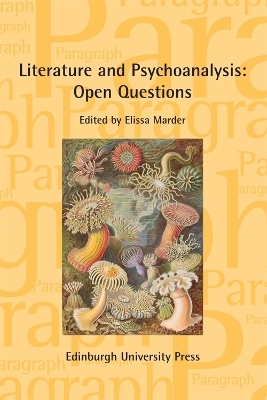
Literature and Psychoanalysis: Open Questions
Paragraph Volume 40, Issue 3
Seiten
2017
Edinburgh University Press (Verlag)
978-1-4744-2483-7 (ISBN)
Edinburgh University Press (Verlag)
978-1-4744-2483-7 (ISBN)
Inspired by Shoshana Felman s 1977 volume, Literature and Psychoanalysis: The Question of Reading (Otherwise")
In 1977, Shoshana Felman opened up the question of how literature and psychoanalysis speak to each other's most intimate concerns with her landmark volume of Yale French Studies entitled Literature and Psychoanalysis: The Question of Reading ("Otherwise"). That relationship, she proposed, needed to be reinvented and transformed into a real dialogue between two different bodies of language and two different modes of knowledge. Over the forty years that have elapsed since the publication of Felman's 1977 volume, the encounter between literature and psychoanalysis has participated in the emergence of several new fields of critical inquiry, such as trauma, testimony, affect theory, neuro-psychoanalysis, and performance studies, and has been a privileged space for reflections on mourning, singularity, translation, transference, and translatability, the death drive, repetition, violence, cruelty, virtual reality, the clinic, and sexuality. In a world that has become enamored with modes of knowledge production that respond to ever increasing demands for quantifiable verification (the science of the brain) or for programmatic applicability, literature and psychoanalysis continue to offer an intractable resistance. Inspired (both directly and indirectly) by Felman's 1977 volume and working from the premise that this intractability is itself a source of potential transformation, the essays in this issue of Paragraph look to literature and psychoanalysis to invent new forms for the future.
In 1977, Shoshana Felman opened up the question of how literature and psychoanalysis speak to each other's most intimate concerns with her landmark volume of Yale French Studies entitled Literature and Psychoanalysis: The Question of Reading ("Otherwise"). That relationship, she proposed, needed to be reinvented and transformed into a real dialogue between two different bodies of language and two different modes of knowledge. Over the forty years that have elapsed since the publication of Felman's 1977 volume, the encounter between literature and psychoanalysis has participated in the emergence of several new fields of critical inquiry, such as trauma, testimony, affect theory, neuro-psychoanalysis, and performance studies, and has been a privileged space for reflections on mourning, singularity, translation, transference, and translatability, the death drive, repetition, violence, cruelty, virtual reality, the clinic, and sexuality. In a world that has become enamored with modes of knowledge production that respond to ever increasing demands for quantifiable verification (the science of the brain) or for programmatic applicability, literature and psychoanalysis continue to offer an intractable resistance. Inspired (both directly and indirectly) by Felman's 1977 volume and working from the premise that this intractability is itself a source of potential transformation, the essays in this issue of Paragraph look to literature and psychoanalysis to invent new forms for the future.
Elissa Marder (Ph.D., Yale University, 1989); joint appointment in the Departments of French and Comparative Literature; international fellow at the London Graduate School: 19th and 20th century French, British, and American literature, literary theory, psychoanalysis, feminist theory, film, and photography. Professor Marder was a founding member of the Emory Psychoanalytic Studies Program and currently is on the PSP Exectutive Committtee.
| Erscheinungsdatum | 30.11.2017 |
|---|---|
| Reihe/Serie | Paragraph Special Issues |
| Verlagsort | Edinburgh |
| Sprache | englisch |
| Maße | 156 x 234 mm |
| Themenwelt | Schulbuch / Wörterbuch ► Lexikon / Chroniken |
| Geisteswissenschaften ► Philosophie ► Allgemeines / Lexika | |
| Geisteswissenschaften ► Philosophie ► Erkenntnistheorie / Wissenschaftstheorie | |
| Geisteswissenschaften ► Philosophie ► Sprachphilosophie | |
| Sozialwissenschaften | |
| ISBN-10 | 1-4744-2483-X / 147442483X |
| ISBN-13 | 978-1-4744-2483-7 / 9781474424837 |
| Zustand | Neuware |
| Informationen gemäß Produktsicherheitsverordnung (GPSR) | |
| Haben Sie eine Frage zum Produkt? |
Mehr entdecken
aus dem Bereich
aus dem Bereich
die letzten Jahre der Philosophie und der Beginn einer neuen …
Buch | Hardcover (2024)
Klett-Cotta (Verlag)
28,00 €
Konfuzianismus, Daoismus, Buddhismus
Buch | Softcover (2023)
C.H.Beck (Verlag)
18,00 €


